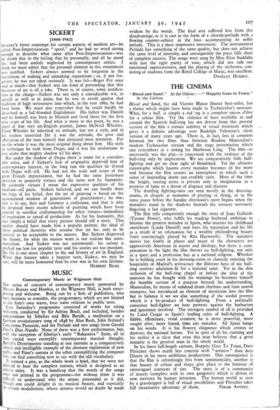MUSIC
Contemporary Music at Wigmore Hall • THE series of concerts of contemporary music sponsored by Messrs. Boosey and Hawkes, at the Wigmore Hall, is, both enter- prising and welcome. Being run by a firm of publishers, who have business to consider, the programmes, which are not limited to the firm's own wares, bear some relation to public taste.
Last Saturday's programme consisted of works for string orchestra, conducted by Sir Adrian Boult, and included, besides compositions by Sibelius and Bela Bartok, a meditation on a German revolutionary song of 1848 by Alan Bush, John Ireland's Concertino Pastorale, and the Prelude and two songs from Gerald Finzi's Dies Natalis. None of these was a first performance, but, with the exception of Sibelius's early " Rakastava " Suite, all in their varied ways exemplify contemporary musical thought, Bartok's Divertimento standing at one extreme as a comparatively simple and intelligible example of the abstruse exploration of new paths, and Finzi's cantata at the other exemplifying the composer who can find something new to say with the old vocabulary.
It seemed a pity, as the whole work is brief, that we were not allowed to hear the complete cantata, which is designed as an artistic unity. It was a handicap that the words of the songs Were not printed in the programme—for without them it was difficult to understand why the arioso proceeded as it did, though one could delight in its musical beauty, and especially in certain modulations, whose aptness would no doubt be made evident by the words. The final aria suffered less from this disadvantage, as it is cast in the form of a chorale-prelude with a flowing counter-subject in the bass accompanying its noble melody. This is a most impressive movement. but instrumental Prelude has something of the same quality, but does not achieve the same level of intensity, and consequently the piece falls short of complete success. The songs were sung by Miss Elsie Suddaby with just the right purity of tone, which did not rule out emotional expressiveness, and the playing of the orchestra, con- sisting of students from the Royal College of Music, was excellent.
DYINIELEY HUSSEY.


























 Previous page
Previous page